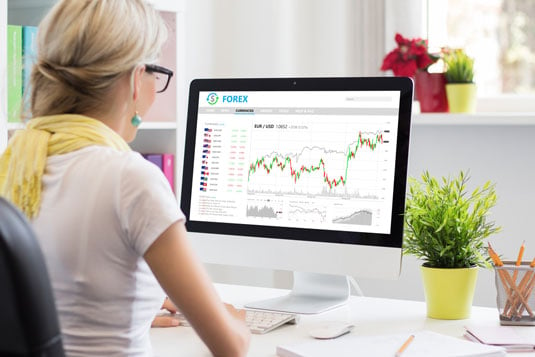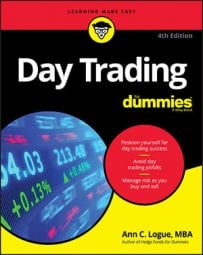 ©Kaspars Grinvalds/Shutterstock.com
©Kaspars Grinvalds/Shutterstock.comYou love being independent
Day trading is like owning any small business. You’re the boss and you call the shots. Each day’s successes — and failures — are due to you and you alone. The market is irrelevant because you can’t control it. Working by yourself all day, you’re responsible for everything from the temperature in the office to the functioning of the computers to the accounting for trades.Good day traders are independent. They don’t want someone to tell them what to do; they want to figure it out for themselves. They love a challenge, whether it’s finding a good bargain on office supplies or developing a profitable way to arbitrage currency prices.
If you would like to work for yourself and control your own destiny, keep reading. Day trading may be for you.
You want to work anywhere you like
As a day trader, you have the luxury of setting up shop wherever you please. All you need is an account with an online brokerage firm and high-speed Internet access. You don’t even need a computer if you have a smart phone. Nowadays you can find these tools almost anywhere: at home, at the library, in a bar, in a big city, in a small town, in the mountains, or in another country. Day trading offers a lot of geographic flexibility, which few other businesses do. You can trade while traveling as easily as you would trade at home — especially with improved mobile services.You’re comfortable with technology
The financial-services industry was one of the first to embrace computer technology in a big way, back in the 1960s, and it is still a technology-intensive industry. The people in colored cotton jackets running around the exchange floor, waving their hands and yelling at each other, are anachronisms.Day traders use software to develop and refine their trading strategies. They trade online using programs to monitor and automate their trades. They track their trades in spreadsheets and other software. They spend their days in front of a screen, communicating online with other traders all over the world. They interact with computers, not human beings, during the trading day. In fact, many successful day traders automate their trading — programming skills can be a big help.
Day traders are also self-employed, and many work from home. That means that if their software crashes, they have to fix it. They have to handle the upgrades, install the firewalls, and back up the data. Sure, you can pay someone to do these tasks, but the tech consultant probably won’t be able to drop everything to get you up and trading again immediately. Hence, good day traders are comfortable with technology. If you like to mess around with programs, don’t mind maintaining your computer, and understand how to set up your hardware for maximum efficiency, you’re in good shape for day trading.
You want to eat what you kill
You don’t have to be a self-employed day trader to trade securities. Brokerage firms, hedge funds, and exchange traders employ people to trade for them. In fact, most securities trading takes place through such larger organizations. But maybe you don’t want to share your profits with someone else. Maybe you don’t want someone dictating your strategy, placing limits on your trades, or determining your bonus based as much on factors such as teamwork and firm profitability as on what you brought in. You want to “eat what you kill,” as they say, and day trading is one way you can do that.When you day trade, you’re responsible for your profits and your losses. That means that you reap the rewards and you don’t have to share them with anyone else. It’s a powerful incentive for independent people.
You love the markets
Good day traders have always been fascinated with the markets and how they move. If you watch CNBC for fun and have been following the securities business for years, no matter what your day jobs have been, then you may be a good candidate for day trading. Of course, I hope you’ve picked up more than “some people make a lot of money doing this!” A lengthy immersion in the cycles and systems that drive securities prices can help you develop trading strategies and know what you are up against.And the markets are amazing, aren’t they? All the buyers and sellers with all their different needs come together and find the price that gets the deal done. The prices assimilate all kinds of information about the state of the world, the desires of the people trading, and the future expectations for the economy. It’s capitalism in its purest form, and watching how it works is almost magical. If you love how the markets work and want to learn first-hand what they tell you about making money, then by all means keep reading.
You have market experience
If you have never opened an account with a brokerage firm, purchased a stock, or invested in a mutual fund, you may not be suited for day trading. It’s not that those activities alone are adequate preparation for day trading, but they’re a start. They can help you understand all that can happen to cause you to make or lose money.You’ve studied trading systems and know what works for you
Much of the work of day trading takes place long before entering the buy or sell order. You have to define your trading system, see how it would have worked in the past, and test it to see how it works now. The preparatory work isn’t as exciting as actually doing the day trading, because you aren’t making real money, but you’re not losing money, either.Short-term trading has a huge potential for loss, and many traders are chasing the exact same ideas. The more you know about how your strategy works in different market conditions, the better prepared you will be to act appropriately and profitably.
It can take a long time to find a strategy that works enough of the time to make it worth your while. Many day traders spend months developing, testing, and refining their day trading strategy.
Because backtesting (which lets you test your trading strategy) uses historic prices, you can do much of the work on the side, at night, and on weekends, before you start day trading full time. It’s a good way to get prepared for your trading business while you save your money and make other preparations for your new day trading venture.
You’re decisive and persistent
Short-term traders don’t have the luxury of thinking too much about what they’re doing. Trading has to become intuitive. They have to be able to act on what they see when they see it. There’s no room for second guessing, for hesitation, for choking, or for panic attacks.Good day traders are also persistent. After they find a strategy they trust, they stick with it no matter how things are going. That’s how they’re able to buy low and sell high.
Even great traders go through bad periods, but if they trust their system and continue to stick with it, they usually pull out of the bad period, often with money ahead. If you’ve been able to stick it out when things went wrong other times in your life, you know what to expect when day trading.
You can afford to lose money
Obviously, you want to make money. That’s the whole idea of day trading. But day trading is difficult. Most traders quit in the first year. Some can’t take the stress, some lose all their money, and some simply don’t make enough money to make it worth their time.Like any small business, you’re taking a risk when you set up shop as a day trader. That risk is easier if you can afford to lose money. I’m not saying you need to have so much money that you won’t miss it when it’s gone, but you shouldn’t be day trading with money you need to live on, any more than you would open a store or start a law practice with money you need to buy groceries and pay the mortgage.
If your household does not have a second source of income, be sure to set aside enough money to cover your living expenses while you get started. And you should keep a second pot of money, your walk-away fund, so that you’re free to quit day trading and move on to your next adventure if you decide it’s not for you.
It’s especially important to have a financial cushion when you’re day trading for the following reasons:- You can afford to commit to your trading: Having your living expenses covered, at least at first, isn’t just about dealing with losses. It’s also about being able to stick with your trading. If you need cash to pay your bills, you may be tempted to take money out of the market whenever you’re doing well. Doing so may keep you from reinvesting your profits. Plus, by not sticking to your strategy, your trading capital won’t grow as fast. Think of day trading as a way to build a long-term asset, not a way to generate a steady stream of current income.
- You can stay in the market through the rough times: You know the old saying that the best way to make money is to buy low and sell high, right? Well, this means that the best time to buy is usually when securities prices have been beaten up and you’ve lost a lot of money. If you can afford some losses, staying in the game will be easier. Plus, you’ll be able to stick to your strategy so that you can profit big when the market finally turns.
- You can better handle the stress of losses: Not all your trades are going to work out. Some days, you’re going to lose money. If you have enough money that you don’t fear loss, you can make better decisions. And you’re less likely to panic if you know that you’ll still be able to eat, pay your electric bill, and have a roof to sleep under at night. With sufficient funds, you’re better able to view the markets clearly and follow a winning strategy.
You have a support system
Trading is stressful. The markets gyrate from events that no one can foresee. Things just happen, and no one else who’s trading cares how these events affect you. It’s enough to make you crazy some days, and unfortunately, some traders do get crazy. Alcoholism, depression, divorce, and suicide seem to be occupational hazards for those traders who have trouble separating what’s happening in the market with who they are as people.The securities markets are wonderful mechanisms for bringing together diverse buyers and sellers. They are not wonderful for propping up your ego, helping you through a rough time in your life, or slipping you a little extra money when you most need it. The markets are not human. They are ruthless machines designed to generate the best price for the aggregate of the buyers and sellers participating that day. Some days, the markets will be in your favor, and some days, they will go against you.
Good day traders are psychologically strong. They understand how their weaknesses come out when they are stressed. They have people (good friends and supportive families) and activities (from exercise routines to hobbies) that help give their brains a break from trading.
